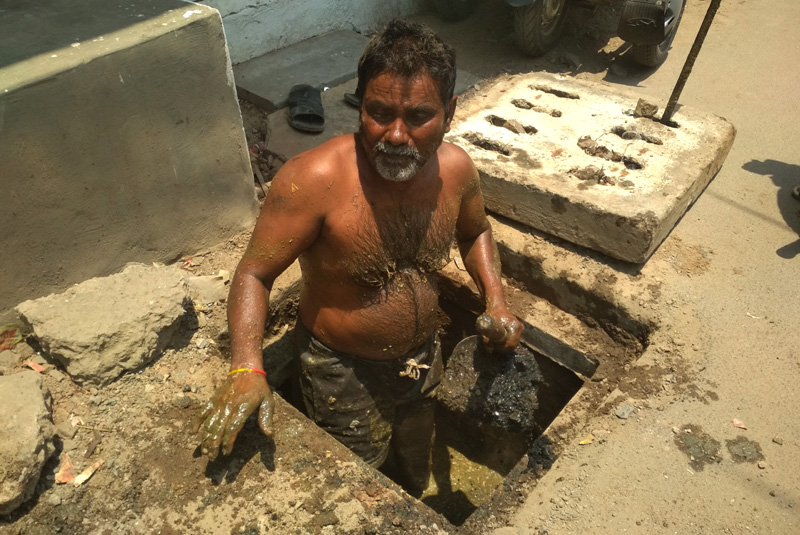In 2015, when Modi launched the Swachh Bharat Abhiyan, his propaganda machinery went overboard, claiming that every city, town and village in India would be sparkling clean. Why? Because there is a government committed to cleanliness.
Social media was awash with posts of parliamentarians sweeping the streets. It was nothing but a mere ‘photo-op,’ a poser for the press where they were holding brooms pretending to clean an already clean road. Indeed, in a country like India, the most populous country in the world, it is essential to promote cleanliness. Swachh Bharat was nothing more than a political stunt.
However, the Swachh Bharat Abhiyan left out sanitation workers, a section of society who have been unfairly oppressed by a centuries-old caste structure that permeates Indian society. Prime Minister Modi may have symbolically acknowledged the injustice done to them – by washing the feet of a few sanitation workers, but he did not do much to end the discrimination they face. Prime Minister Modi’s symbolism – in full public display, in front of all the cameras – was also nothing more than a photo op, a media stunt meant to gain political mileage.
In this article, I focus on manual scavengers who face systematic oppression and are treated as modern slaves. Report after report documents the deaths and ill health of India’s sanitation workers – because of the poisonous stench and filthy working conditions. When the Swachh Bharat Abhiyan was launched, India’s sanitation workers had hoped to get proper equipment and better working conditions. But the dehumanising practice of manual scavenging persists.
Manual scavenging – where humans are employed to remove waste – is degrading, illegal and inhuman work. It is against human dignity. In India, ‘lower-caste’ groups are forced – structurally – into such work. They are expected to clean dry toilets, collect faeces, load them into cane baskets or metal troughs, and carry them away for disposal at the outskirts.
On September 6, 2013, the Indian Parliament passed The Prohibition of Employment as Manual Scavengers and Their Rehabilitation Act, 2013 (the 2013 Act), committing itself yet again to ending manual scavenging. Seven months later, on March 27, 2014, the Indian Supreme Court held that India’s constitution requires state intervention to end manual scavenging and “rehabilitate” all people engaged in the practice. This meant ending the practice and the abuses faced by communities engaged in manual scavenging.
The government’s recognition in the 2013 Act of the historically rooted and ongoing injustice faced by communities engaged in manual scavenging is important but also points to failures in implementing previous laws and policies to address the problem.
Regardless, recent examples from communities engaged in manual scavenging in the states of Gujarat, Madhya Pradesh, Maharashtra, Rajasthan, and Uttar Pradesh highlight the failures of previous government attempts to end manual scavenging and eliminate the entrenched attitudes and discriminatory practices that still bind members of affected communities to this degrading occupation.
The Modi government, despite all its symbolism, has not done much. Why? They do not form an essential vote bank; they have been rendered powerless. Moreover, the upper castes derive their social authority by oppressing the lower castes. A politically important section, a key ‘vote bank,’ they need to be kept happy. So, by informally protecting caste boundaries through its inaction, the government perpetuates manual scavenging. In short, manual scavenging is a carefully structured system that ensures a cycle of exploitation.
Why isn’t the government investing in technology to eradicate the abominable practice of manual scavenging?
In 2020, the Madras High Court instructed municipalities to provide workers with proper equipment to ensure their safety. Yet, one hears reports of manual scavenging regularly.
Manual scavenging is modern slavery. The fact that manual scavenging is prevalent in India, the so-called ‘mother of democracy’, is a national shame, an abomination. It is a grotesque injustice, particularly to the poor, marginalised and socially deprived sections of society.
Manual scavenging is a blot on India’s democracy; it goes against the grain of human rights and basic human dignity. If India needs to claim its rightful place as a democracy, it needs to ensure that it needs to eradicate the source of manual scavenging. The Prime Minister and members of his party, instead of using policies as photo opportunities and media stunts, must put in place systems that eradicate manual scavenging from India forever.
-30-
Copyright©Madras Courier, All Rights Reserved. You may share using our article tools. Please don't cut articles from madrascourier.com and redistribute by email, post to the web, mobile phone or social media.Please send in your feed back and comments to [email protected]











